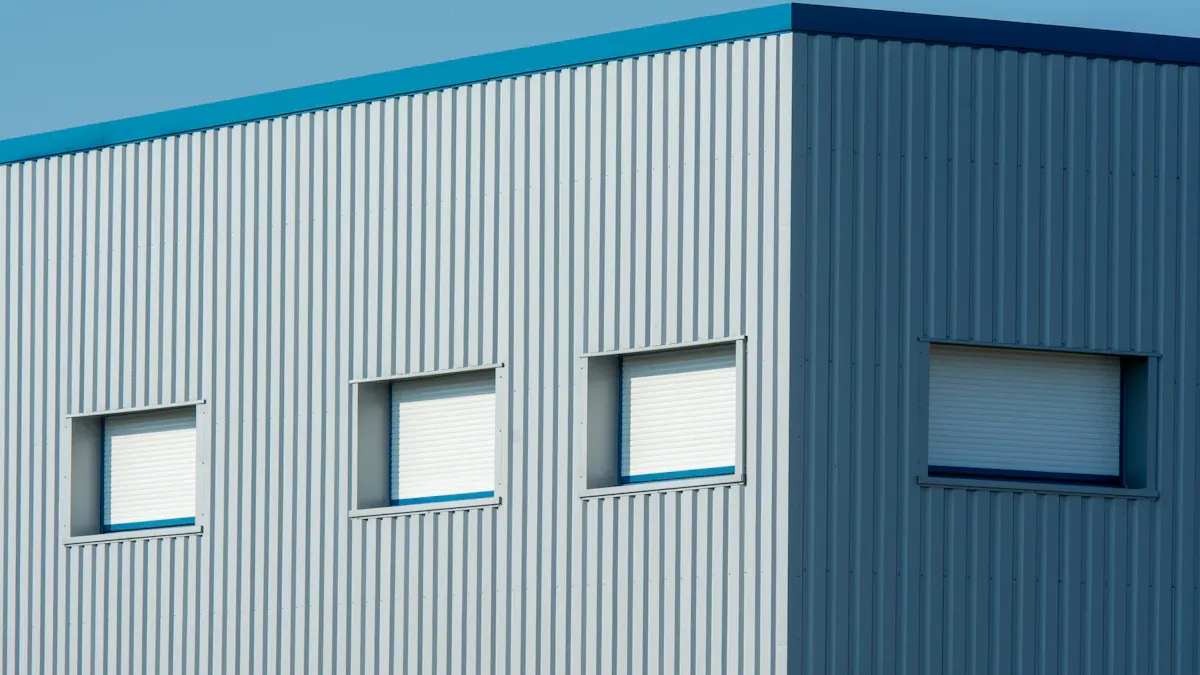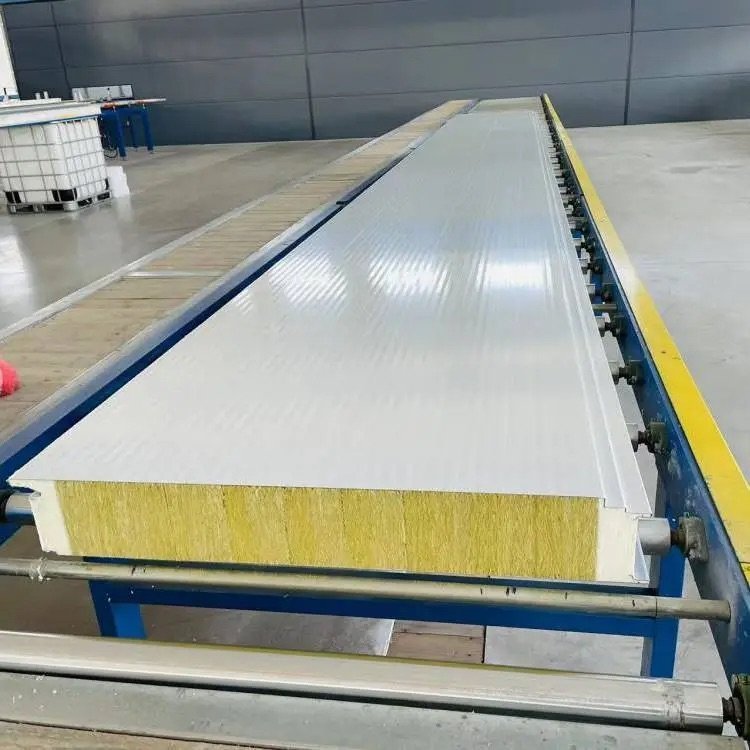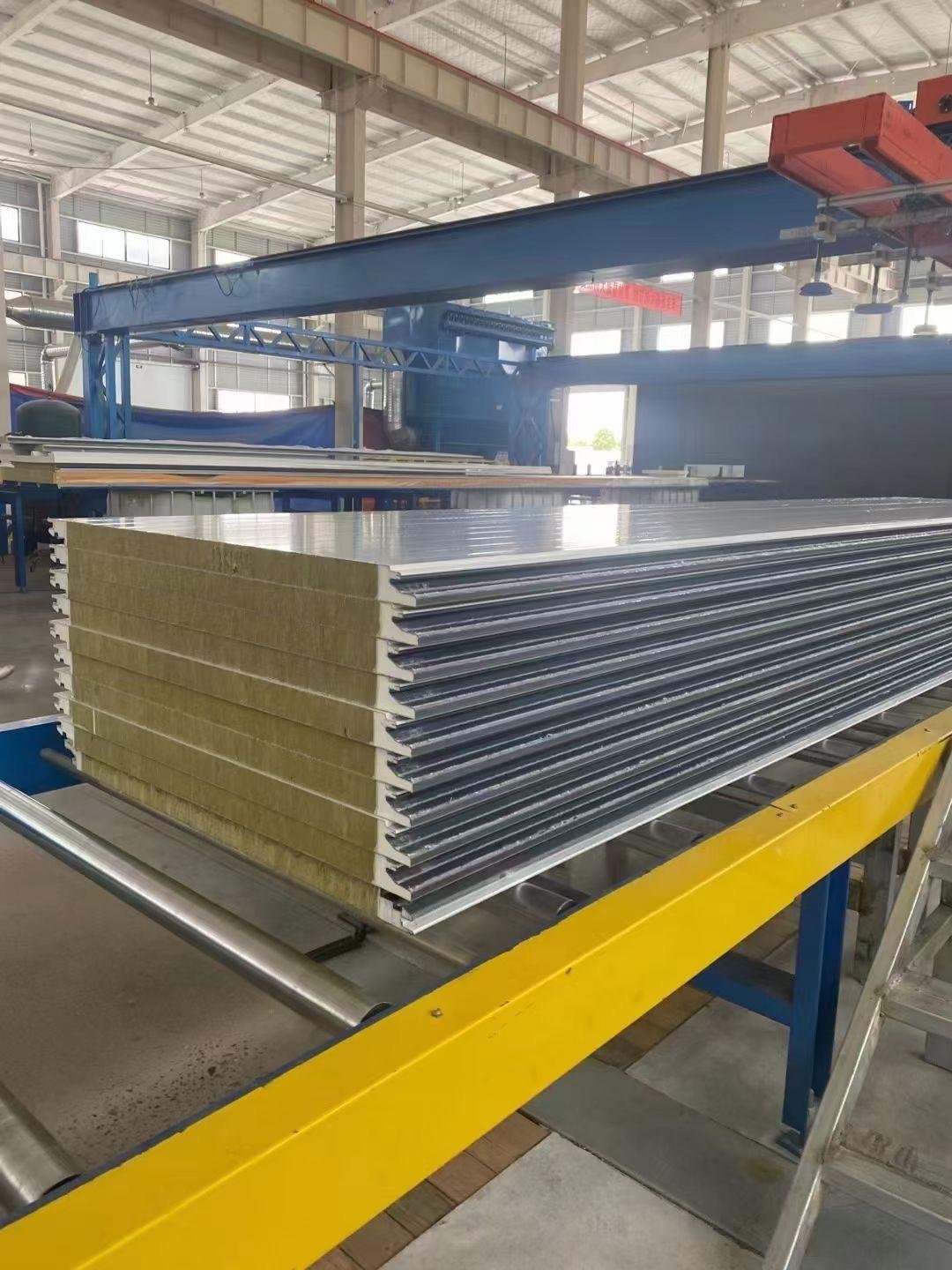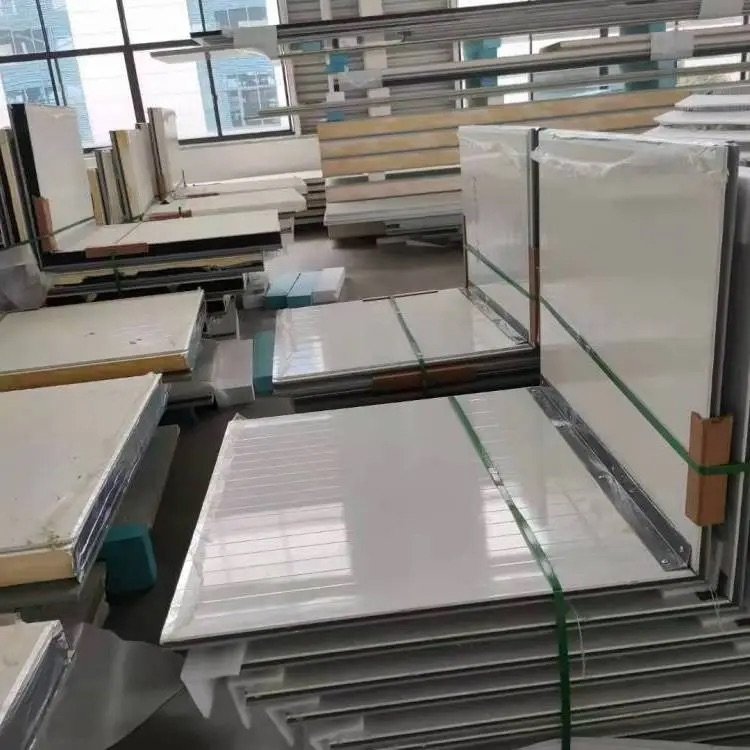
Certifications needed are important to ensure PU sandwich panels follow rules. They confirm safety, quality, and legal requirements. Without them, selling in the market or earning trust is hard. Important certifications like Bs1d0 and CE Marking show fire safety and quality. Following these rules helps you stay legal and improves your reputation. Focusing on the certifications needed helps meet industry needs and succeed long-term.
Key Takeaways
Certifications like Bs1d0 and CE Marking prove PU sandwich panels are safe and high-quality. These are needed to sell in Europe.
The Bs1d0 fire rating is important for safety. It ensures panels make little smoke and no flaming drops, which is key for schools and hospitals.
FM Approvals build trust by showing panels are very safe. This is especially important for places with fire risks, like food factories.
The EPAQ Quality Certificate shows top manufacturing practices. It helps your panels stand out in markets that care about quality.
Environmental Product Declarations (EPDs) show you care about the planet. This attracts eco-friendly buyers and boosts your brand’s reputation.
Key Certifications Needed for PU Sandwich Panels in Europe

Bs1d0 Fire Classification
The Bs1d0 fire rating is very important in Europe. It ensures PU panels meet strict fire safety rules. This rating checks how materials act during a fire. For PU panels, it tests flame spread, smoke levels, and dripping. Materials must meet these rules: low smoke (s1), no drips (d0), and limited burning (B). These rules help lower fire dangers in buildings.
Looking at test results shows why this rating matters. For example, how fast flames spread and how quickly they stop are key. Panels must stop fire from spreading and go out fast. Also, the material should not drip when burning. This keeps homes and workplaces safer.
Did you know? The 2023 International Building Code (IBC) now asks for better fire ratings for wall materials. This makes Bs1d0 even more important for selling panels.
FM Approvals
FM Approvals prove PU panels meet high safety standards. This focuses on fire resistance and strong structure. It is especially needed in industries like food factories, where fires are a big risk. FM Data Sheet 1-57 lists sprinkler rules for PU panels. These rules are stricter than usual to improve fire safety.
PU panels need fewer sprinklers than EPS panels. But they still need proper safety steps. FM Approvals show buyers your panels are safe and reliable. This also helps build trust in your product.
CE Marking
CE Marking is required to sell PU panels in Europe. It shows your product follows EU safety and health rules. Without it, you cannot legally sell your panels in Europe.
A 2022 study found 78% of EU buyers need CE Marking for building materials. This shows how important it is for selling your product. CE Marking also shows customers you care about quality and safety.
Tip: The Carbon Border Adjustment Mechanism charges for high-emission imports. Getting CE Marking can help you meet green goals and avoid extra costs.
EN 14509 Standard
The EN 14509 standard checks how strong and energy-efficient PU panels are. It ensures panels meet Europe’s strict rules for safety and durability. This standard applies to factory-made panels with metal sides and a polyurethane core.
Your panels must follow EN 14509 to prove they are strong and insulated. It tests things like how much weight they hold and how they handle wind. It also checks if they keep water and air out, which protects buildings.
Meeting this standard shows your panels work well in different conditions. It makes your product more reliable and builds customer trust in your brand.
EPAQ Quality Certificate
The EPAQ Quality Certificate is a special award for high-quality PU panels. It is given by the European Association for Panels and Profiles (EPAQ). This certificate focuses on good manufacturing and great product performance.
To get this certificate, you must follow strict production rules. Regular checks make sure your panels stay high-quality over time. The certificate looks at size accuracy, surface finish, and insulation ability.
Having the EPAQ Quality Certificate makes your panels stand out. It shows customers your products are top-notch and meet high standards. This can help you compete better in quality-focused markets.
Environmental Product Declarations (EPD)
Environmental Product Declarations (EPDs) explain how PU panels affect the environment. They follow global rules like ISO 14025 and EN 15804. EPDs measure energy use, carbon output, and resources used during a panel’s life.
A study called “The Impact of Environmental Product Declarations (EPDs) on Green Bio-Composite Strategic Marketing” shows EPDs help promote eco-friendly practices. For PU panels, EPDs prove you care about the environment. They also give clear details so buyers can choose wisely.
Getting EPDs matches your products with the need for green materials. This helps the planet and improves your brand’s image in the market.
Avis Technique (France-Specific Certification)
If you want to sell PU sandwich panels in France, you need the Avis Technique certification. This approval shows your panels meet French building rules. It checks if your panels are safe, strong, and fit for use in buildings.
The Avis Technique is given by the French Scientific and Technical Center for Building (CSTB). To get it, your panels must pass tough tests. These tests check things like heat insulation, fire safety, and strength. They also see how your panels handle weather and stress in real life.
A special part of the Avis Technique is its focus on new ideas. If your panels use new materials or designs, this certification proves they work well. It gives builders and architects in France the details they need to trust your product.
Tip: Getting the Avis Technique helps you follow rules and gain trust. It shows your panels meet the high standards of French builders and officials.
To keep this certification, you must update your product info and pass regular checks. This ensures your panels stay up to date with French building rules. By getting this certification, you make your panels a top choice in France.
Explanation of Each Certification

Bs1d0 Fire Classification: What It Means and Its Requirements
The Bs1d0 fire classification is very important in Europe. It checks if PU panels meet strict fire safety rules. This rating looks at three things: how easily the material burns (B), how much smoke it makes (s1), and if it drops flaming pieces (d0).
To get this rating, panels must pass tough fire tests. These tests check how fast flames spread and how much smoke is made. Panels with Bs1d0 make little smoke and don’t drop burning pieces. This makes them safer for buildings. Schools and hospitals need this certification because fire safety matters most there.
Tip: Always check local building rules to make sure your panels meet fire safety needs.
FM Approvals: Ensuring Safety and Loss Prevention
FM Approvals focus on keeping buildings safe and lowering risks. This certification checks fire resistance, strength, and reliability. It is very useful for places like food factories and cold storage, where fires can be dangerous.
To get FM Approvals, panels go through many tests. These tests check how well panels resist fire and stay strong under pressure. Passing these tests shows your panels are safe and tough. This can help you sell more panels and stand out in the market.
Did you know? Panels with FM Approvals often need fewer sprinklers, saving customers money.
CE Marking: Mandatory for Market Access in Europe
CE Marking is required to sell PU panels in Europe. It proves your panels follow EU safety, health, and environmental rules. Without this certification, you cannot legally sell your panels in Europe.
To get CE Marking, you must do product tests and prepare documents. You also need to show your panels meet EU standards. Once certified, the CE Mark tells buyers your panels are safe and high-quality.
Note: CE Marking helps with green building goals. Following EU rules can make your panels eco-friendly and better for the planet.
EN 14509 Standard: Strength and Insulation Rules
The EN 14509 standard checks if PU panels are strong and insulated. It ensures panels work well in real-life conditions. This includes testing their strength, durability, and ability to keep heat inside.
To meet this standard, panels must pass these tests:
Material strength: The core and outer layers must be tough.
Heat insulation (U-value): This shows how well panels stop heat loss.
Weather durability: Panels must handle heat, cold, and moisture.
Fire safety: Panels must lower fire risks in buildings.
Tests copy how panels are used in real buildings. This proves they are safe and energy-efficient. Meeting EN 14509 shows your panels are reliable and good for construction.
Tip: Check your panel designs often to keep meeting this standard.
EPAQ Quality Certificate: Proving Top Manufacturing Standards
The EPAQ Quality Certificate shows PU panels are made with care. This award, from the European Association for Panels and Profiles, focuses on quality and following rules.
To get this certificate, you must follow strict rules like:
Making sure panels have the right size and thickness.
Keeping the surface smooth and neat.
Checking that panels insulate properly.
Regular checks ensure your panels stay high-quality. Having this certificate shows buyers your panels are the best. It helps you compete in markets where quality is key.
Did you know? Panels with this certificate work great in tough places like cold storage.
Environmental Product Declarations (EPD): Eco-Friendly Panels
Environmental Product Declarations (EPDs) explain how PU panels affect nature. They follow global rules like ISO 14025 and EN 15804. EPDs check a product’s full life, from making it to throwing it away.
EPDs measure things like:
Energy used to make the panels.
Carbon released during their life.
Resources and water used.
Here’s how EPDs compare to Product Carbon Footprints (PCFs):
Feature | Environmental Product Declarations (EPDs) | Product Carbon Footprints (PCFs) |
|---|---|---|
Focus | Many environmental effects | Only greenhouse gases |
Verification | Checked by experts | Sometimes self-reported |
Rules Followed | ISO 14025, EN 15804 | No set global rules |
Purpose | Compare products, get certifications | Check emissions over time |
Measures | Includes water and resources used | Only carbon dioxide levels |
Getting EPDs shows you care about the planet. It helps meet the need for green building materials. It also makes your brand look responsible and eco-friendly.
Note: Adding EPDs can attract buyers who want green products.
Avis Technique: Certification for Selling in France
The Avis Technique is needed to sell PU panels in France. It proves your panels follow strict French building rules. Without it, your panels might not be allowed in French projects.
This certification comes from the French Scientific and Technical Center for Building (CSTB). To get it, your panels must pass tough tests. These tests check things like heat insulation, fire safety, and strength. They also see how your panels handle weather and stress in real-life situations.
A special part of the Avis Technique is its focus on new ideas. If your panels use new designs or materials, this certification shows they are safe and work well. This matters in France, where builders like using modern solutions.
Tip: Show off your panel’s unique features when applying for the Avis Technique. This can help you stand out in France’s market.
To keep this certification, you must update product details and pass checks often. This ensures your panels still meet French rules. Getting the Avis Technique helps you follow laws and gain trust. It shows your panels are safe, high-quality, and ready for tough projects.
Note: The Avis Technique is key for selling in France. It proves your focus on safety, quality, and new ideas.
Steps to Obtain Certifications

Learning Certification Rules
First, learn the rules for each certification. Each one has different needs. For example, Bs1d0 checks fire safety, while CE Marking follows EU rules. Read official guides to understand the steps and tests required.
Look into industry tips and advice. Many groups share helpful resources. Joining forums or associations can give you more ideas. Knowing these details helps you prepare better.
Tip: Make a checklist for every certification. This keeps you organized and ensures you don’t forget anything.
Collecting Required Documents
Gather all the needed documents. Most certifications ask for technical details about your panels. This includes material info, test results, and production data. For CE Marking, you need a Declaration of Performance (DoP). This proves your product meets EU rules.
Keep your documents neat and easy to find. Use folders or digital tools to organize them. Check that all details are correct and updated. Missing or wrong info can slow things down.
Note: Some certifications, like EPDs, need environmental data. Include reports on carbon footprints and lifecycle impacts if required.
Testing and Inspections
Testing is very important for getting certifications. Your panels must pass tests to meet standards. For example, fire tests are key for Bs1d0, and EN 14509 needs strength and insulation tests.
Use trusted labs for testing. These labs follow strict rules for accurate results. Inspectors might also visit your factory to check your processes. They ensure your production matches the certification rules.
Plan tests and inspections early to avoid delays. Keep all test results and inspection reports safe. These are often needed for final approval.
Tip: Test your panels regularly, even after getting certified. This keeps quality high and ensures you follow the rules.
Working with Notified Bodies and Certification Authorities
Working with notified bodies and certification authorities is very important. They check if your PU sandwich panels meet European rules. Their approval is needed to sell your panels in the market. To work well with them, follow these steps:
Talk Clearly and Often: Good communication helps a lot. Talk to them before and after applying for certification. This helps you understand what they need and fix problems early. The MDCG 2019-6 Q&A guide shows how these talks make the process easier.
Use Old Evidence: If you already have test results, use them again. This saves time and avoids doing the same work twice. It also helps focus on checking if your panels meet the rules.
Organize Your Documents: Make sure your files are complete and correct. Include details like material info, test results, and how your panels are made. Neat documents make reviews faster and avoid delays.
Answer Quickly: If they ask for more info, reply fast. This keeps the process moving smoothly.
Tip: Build a good relationship with your notified body. Talking often builds trust and makes future certifications easier.
Keeping Certifications After Approval
Getting certified is just the start. You must keep following the rules to ensure your panels stay safe and reliable. Staying proactive is key.
Check your compliance regularly to find and fix problems early. Important things to track include:
If you follow all the rules.
How well you adapt to new updates.
These checks help you see where to improve. For example, tracking how long it takes to fix issues shows if your process needs changes.
Regular factory checks are also important. They ensure your panels are still made to meet certification rules. Adding daily compliance checks to your routine helps avoid risks. This keeps your certifications and improves your product quality.
Note: Certifications like CE Marking and EN 14509 need regular updates. Following new rules protects your ability to sell and keeps your reputation strong.
Benefits of Following European Standards
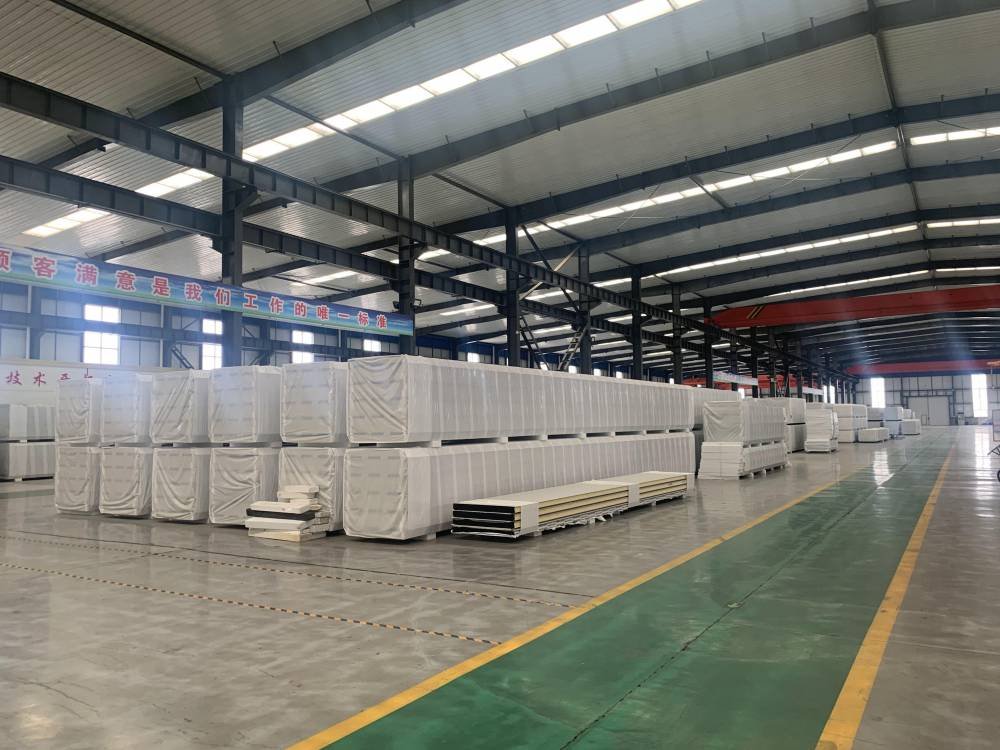
Better Market Access and Competitiveness
Following European standards helps you reach more buyers. Certifications like CE Marking and EN 14509 let you sell PU sandwich panels across Europe legally. These prove your panels are safe and high-quality. Buyers trust certified products more because they are reliable. This gives you an advantage over companies without certifications.
Meeting these standards also helps in global markets. Many international buyers see European certifications as a sign of top quality. By following these rules, your panels look trustworthy and high-grade. This attracts more customers and increases your sales.
Higher Safety and Performance Levels
Certifications make sure your PU panels are safer and work better. For example, the Bs1d0 fire classification ensures low smoke and no flaming drips during fires. This makes buildings, like schools and hospitals, safer. Similarly, EN 14509 checks that your panels are strong, long-lasting, and energy-saving.
Here’s how PU panels compare to older materials:
Feature | PU Sandwich Panels | Older Materials |
|---|---|---|
Fire Safety Rating | Class B-s1,d0 | Often lower |
Heat Conductivity | <0.022 W/m·K | 0.35–0.50 W/m²K (brick) |
U-values | 0.18–0.22 W/m²K | 1.50–2.50 W/m²K (no insulation) |
30–40% | Not applicable | |
Regulation Compliance | High (EU, ASHRAE) | Lower, depends on region |
This table shows how certified PU panels are better in safety, insulation, and saving energy. By meeting these standards, your panels become safer and more useful for builders and users.
Gaining Customer and Stakeholder Trust
Certifications show your panels meet high standards, building trust. Customers feel confident knowing your products are tested for safety and quality. This trust makes them buy again and improves your reputation.
Architects and contractors also prefer certified products. Certifications help them follow building rules easily. By offering certified panels, you make their work simpler and prove you are dependable.
Tip: Use your certifications in ads to show your focus on quality and safety. This can bring in more buyers and boost your brand’s image.
Avoiding Legal and Financial Penalties
Not following certification rules can cause big problems. Without proper certifications, your PU sandwich panels might break European laws. This could lead to fines, lawsuits, or bans on selling your products. Companies that ignore these rules often face heavy penalties. Here are some examples:
Deutsche Bank was fined $130 million for breaking anti-corruption laws.
BitMEX had to pay $100 million for not having proper licenses.
HSBC UK got an $85 million fine for poor transaction monitoring.
NatWest was fined £265 million for failing to stop money laundering.
These cases show why following rules is so important. For PU panel makers, certifications like CE Marking and EN 14509 help meet safety and quality standards. Getting these certifications lowers the chance of legal trouble and protects your business from losing money. Staying compliant also earns trust from customers and regulators, keeping your business strong.
Tip: Check your certifications often and update them when needed. This helps you avoid mistakes and keeps your panels meeting the latest rules.
Supporting Sustainability and Innovation
Certifications help make PU sandwich panels greener and more advanced. They push companies to use eco-friendly methods and create better technologies. For example, many now use renewable materials and energy-saving designs to meet certification rules. These changes lower harm to the environment and improve how panels work.
Evidence Type | Description |
|---|---|
Bio-based Materials | Using renewable polyols cuts fossil fuel use and emissions. |
Energy Efficiency | PU panels save up to 30% energy, lowering bills by 40%. |
Lifecycle Assessment | Lightweight panels reduce transport pollution and support recycling. |
Advanced Technologies | Water-blown systems use fewer chemicals, improving indoor air quality. |
Aesthetic Versatility | Custom designs meet both style and sustainability needs. |
By meeting certification rules, your products match these eco-friendly goals. This helps the planet and boosts your brand’s image. More customers now want green products, and certified panels show you care about the environment. Certifications also drive innovation, helping you stay ahead in the market.
Note: Spending on green technology can save money over time and open doors in eco-friendly markets.
Certifications like Bs1d0, CE Marking, and EN 14509 are key for PU sandwich panels in Europe. They ensure safety, quality, and follow strict rules. CE Marking works like a trade pass, letting products move freely in the European Economic Area. EN 14509 checks if panels are strong and keep heat in, making them useful for many purposes.
Certification | Why It Matters | Benefits |
|---|---|---|
CE Marking | Works as a trade pass in the EEA | Lets certified products move freely across member countries |
EN 14509 | Lists needed documents and conformity checks | Helps meet rules and sell products in the market |
Focusing on these certifications builds customer trust and opens new markets. Staying certified avoids fines and boosts your brand’s image. Make certifications a key part of your plan to stay competitive and meet industry needs.
FAQ
Why is CE Marking important for PU sandwich panels?
The CE Marking is the most vital certification. It shows your panels follow EU safety, health, and environmental rules. Without it, selling your panels in Europe is not allowed. This certification works like a trade pass across the European Economic Area.
What does Bs1d0 mean for fire safety?
Bs1d0 is a fire safety rating for materials. It checks for low flame spread (B), little smoke (s1), and no flaming drops (d0). This is very important for buildings like schools and hospitals to stay safe during fires.
What papers are needed for CE Marking?
You need a Declaration of Performance (DoP), test results, and technical details. These papers prove your panels meet EU rules. Keeping these documents organized helps avoid delays in the certification process.
How does EN 14509 help with PU panel certification?
EN 14509 makes sure your panels are strong and energy-saving. It tests how well they hold up under real conditions. Passing this standard shows your panels are reliable and good for construction projects.
Why get an EPAQ Quality Certificate?
The EPAQ Quality Certificate proves your panels are made with care. It shows they have accurate sizes, smooth surfaces, and great insulation. This certification improves your product’s image and helps you compete in markets that value quality.
Tip: Show your certifications in ads to attract more buyers. 🏆

